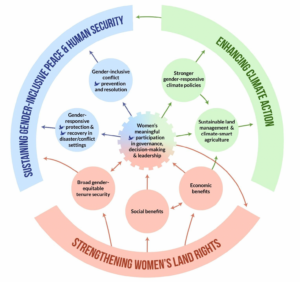© 2015 CGIAR Research Program on Climate Change, Agriculture and Food Security (CCAFS). CCAFS Working Paper no. 79
“These results suggest that many factors are involved in the adoption of CSA practices, including norms of cooperation and trust, social and economic factors, attitudes and orientation of individuals, and access to a variety of information types. Some of these factors, such as improving information channels, are amenable to interventions that can increase awareness and adoption of CSA. However, the fact that many of the commonly-identified interventions to increase CSA (and agricultural technology) uptake, such as extension services, and agri-service providers, do not have a significant positive effect, whereas
innovative attitudes and established trust do play an important role, indicates that there are not necessarily clear and mechanistic “policy levers” that will lead to widespread adoption. Rather, development practitioners and projects must pay greater attention to social and behavioral/attitudinal factors to encourage and facilitate greater adoption of CSA practices.”




